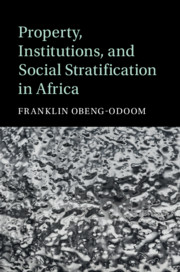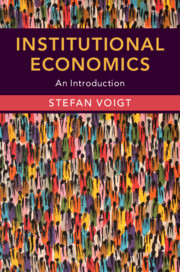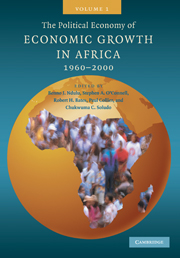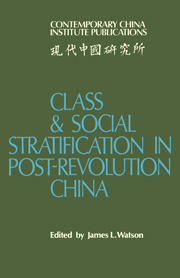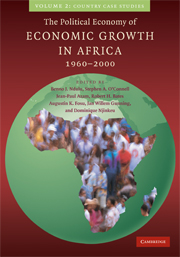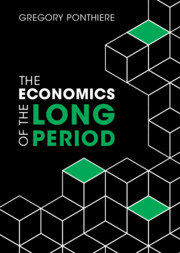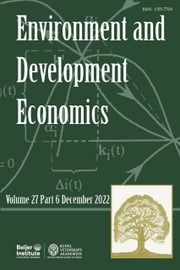Property, Institutions, and Social Stratification in Africa
Part of Cambridge Studies in Stratification Economics: Economics and Social Identity
- Author: Franklin Obeng-Odoom, University of Helsinki
- Date Published: May 2020
- availability: Available
- format: Hardback
- isbn: 9781108491990
Hardback
Other available formats:
eBook
Looking for an inspection copy?
This title is not currently available for inspection. However, if you are interested in the title for your course we can consider offering an inspection copy. To register your interest please contact [email protected] providing details of the course you are teaching.
-
In this book, Franklin Obeng-Odoom seeks to carefully explain, engage, and systematically question the existing explanations of inequalities within Africa, and between Africa and the rest of the world using insights from the emerging field of stratification economics. Drawing on multiple sources - including archival and historical material and a wide range of survey data - he develops a distinctive approach that combines key concepts in original institutional economics, such as reasonable value, property, and the distribution of wealth, with other insights into Africa's development and underdevelopment. While looking at the Africa-wide situation, Obeng-Odoom also analyzes the experiences of inequalities within specific countries. Comprehensive and engaging, Property, Institutions, and Social Stratification in Africa is a useful resource for teaching and research on Africa and the Global South.
Read more- Provides a comprehensive analysis of Africa's development and underdevelopment
- Centers African-developed economics in discussions about representation, providing a powerful tool for increasing visibility and public support for African development
- Uses extensive research on Africa and the Global South to create intellectual resources for teaching about and conducting research on these two regions
Awards
- Winner, 2021 Joan Robinson Best Book Prize, European Association for Evolutionary Political Economy
Reviews & endorsements
'Franklin Obeng-Odoom follows a growing cadre of scholarship generated by African scholars who are particularly engaging African economic issues in a distinctively, self-determined way. In doing exactly that, Property, Institutions, and Social Stratification in Africa is a brilliant book that intellectually grapples with the continent's sustained least developed ranking in the world. Be that as it may, the book also cleverly avoids – and actually effectively debunks – lazy, neoclassical explanations attributing Africa's poverty and inequality to its backwardness and traditional culture. Instead, Obeng-Odoom uniquely formulates a refreshing alternative thesis about African economic prospects using what he refers to as a new theory of black stratification economics. To this end, Obeng's deep structuralist analysis delicately reveals both the historical and continuing external expropriation and transfers of African land, labor, and capital as the source of the problem.' Rita Kiki Edozie, The John W McCormack Graduate School of Policy and Global Studies, UMass Boston
See more reviews'The vast majority of the dubious literature on this profound topic derives from the neo-colonial European-American conceit that the only problem with Nigeria is that it is not more like Norway, and the only problem with South Sudan is that it is not more like Switzerland. The tyranny of the World Bank ideology machine, aided by a compliant cadre of land-obsessed NGOs, has held the stage for too long. Franklin Obeng-Odoom will now teach what must be learned. An African voice on land policy? How novel.' Daniel W. Bromley, University of Wisconsin-Madison
'Franklin Obeng-Odoom's book should be read, both by academics working in the fields of development economics, growth, international economics, socioeconomics, and institutionalism, and by non-economists devoted to Africa … It is also a very good exposition, and students will be able to use the numerous presentations of key theoretical concepts and frameworks in the field of macroeconomics, international economics, economics of the commons, economics of agriculture, institutional economics and socioeconomics.' Abdallah Zouache, African Review of Economics and Finance
'In Property, Institutions and Social Stratification in Africa, Franklin Obeng-Odoom offers a new comprehensive exploration of inequalities within Africa and between Africa and the rest of the world, drawing on stratification economics. The book offers compelling and crucial insight into the deficiencies of mainstream economics when it comes to addressing the roots of poverty and inequality in African countries and provides new evidence of neocolonialism and exploitation of African resources across the continent …' Heba E. Helmy, LSE Review of Books
'… his book has the makings of a foundation text for the new narrative.' Fred Harrison, Land & Liberty
'It is highly recommended for teachers, researchers and students of African political economy around the globe.' Lewis Abedi Asante, Africa Spectrum
'I commend Obeng-Odoom for writing an impressive as well as an inspiring book that forces his readers to look again at what society takes for granted; what are good academics for and, above all, to provoke all of us to think deeply. He most certainly does that admirably.' Samuel K. Andoh, African and Asian Studies
'The ideas in Obeng-Odoom's book should be taken seriously by students, researchers and policy makers interested in Africa and African development.' Isaac Abotebuno Akolgo, Journal of African Political Economy and Development
'Franklin Obeng-Odoom's fascinating book is one from which not just Africans but the rest of us in the global South can derive many valuable lessons for our collective way forward.' Walden Bello, Journal of Australian Political Economy
'… is worthy of reading and contributes to our knowledge of the processes of inequality in very different ways.' Stephanie Seguino, Forum for Social Economics
'Property, Institutions, and Social Stratification in Africa is a book that should inform a new generation of critical development thinking and practice. I recommend this book to anyone committed to learning about Africa, and to better engaging with Africans about development, change, and the future.' Adam Sneyd, Australasian Review of African Studies
'… this book will set a new standard for critical political economy analyses of African economies. I highly recommend it.' Stefan Ouma, Economic Geography
'… challenges prevailing ideas on existing development policies and attempts to provide new alternative perspectives for more equitable economic development in Africa.' Toyomu Masaki, Evolutionary and Institutional Economics Review
'... Obeng-Odoom's latest book presents a fresh, comprehensive political economic framework for the general Global South, specifically Africa. It prioritizes Africans' authority in ongoing economic processes taking place on African soil.' Daphne Engel, SAGE Publications
Customer reviews
Not yet reviewed
Be the first to review
Review was not posted due to profanity
×Product details
- Date Published: May 2020
- format: Hardback
- isbn: 9781108491990
- length: 376 pages
- dimensions: 235 x 158 x 26 mm
- weight: 0.63kg
- availability: Available
Table of Contents
Preface
Part I. The Problem: Introduction. The Global South in a 'compartmentalised world':
1. The foundations for a new beginning
Part II. Problematic Explanations and Solutions:
2. Property economics
3. Land reform
4. Human capital
5. International trade
6. Economic growth
Part III. Alternatives:
7. Socialism
8. Africanisms
Concluding the groundwork for a new political economy of the Global South
Bibliography.-
General Resources
Find resources associated with this title
Type Name Unlocked * Format Size Showing of
This title is supported by one or more locked resources. Access to locked resources is granted exclusively by Cambridge University Press to lecturers whose faculty status has been verified. To gain access to locked resources, lecturers should sign in to or register for a Cambridge user account.
Please use locked resources responsibly and exercise your professional discretion when choosing how you share these materials with your students. Other lecturers may wish to use locked resources for assessment purposes and their usefulness is undermined when the source files (for example, solution manuals or test banks) are shared online or via social networks.
Supplementary resources are subject to copyright. Lecturers are permitted to view, print or download these resources for use in their teaching, but may not change them or use them for commercial gain.
If you are having problems accessing these resources please contact [email protected].
Sorry, this resource is locked
Please register or sign in to request access. If you are having problems accessing these resources please email [email protected]
Register Sign in» Proceed
You are now leaving the Cambridge University Press website. Your eBook purchase and download will be completed by our partner www.ebooks.com. Please see the permission section of the www.ebooks.com catalogue page for details of the print & copy limits on our eBooks.
Continue ×Are you sure you want to delete your account?
This cannot be undone.
Thank you for your feedback which will help us improve our service.
If you requested a response, we will make sure to get back to you shortly.
×
